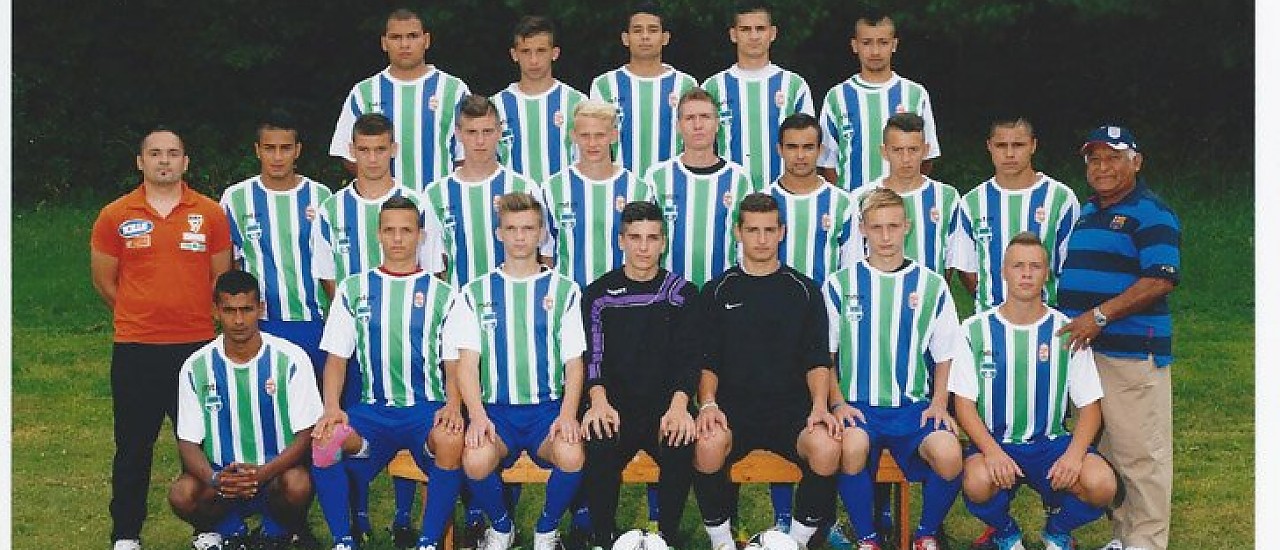Hungarian Gipsy National Football Team
The selection "Hungarian Gipsy National Football Team" is representing the linguistic minority of the Roma in Hungary. The ethnic group of the Roma has its roots in North India, which they left due to wars and persecutions. They moved to the European continent where they settled down. But they arrived late, when the basics of the later states had already been formed. And they were no war folk, so they have never belonged to a mother country and had no real home. They are called diaspora ethnicity, who have a strong community awareness, but no national consciousness. At least since the 16th century Hungary became something like their home because their way of life and culture was accepted there. So determined one of the oldest writs of protection, that of King Sigismund of 1423: "We arrange, in this way we shall protect the Voivode Ladislaus (László Vajda) and the "Gypsies", who are subject to him, to care for and maintain them without obstacle and trouble - even you want to protect them against all inconveniences and annoyances". During the Turkish wars the Roma worked as craftsmen and fulfilled in weapon handling an essential service. Franz Liszt mentioned the great hospitality of Hungarians, which was probably also due to their useful services. But he also admired her musical skills. "Gypsy bands were part of the cultural export from Hungary in the concert halls of Europe. Thus the Roma in Hungary were, compared to other regions of Europe, integrated well and socially recognized. With the beginning of the 19th century a difficult time with discrimination and persecution began. During the German occupation of Hungary in the Second World War were transported up to 30,000 Roma to concentration camps, only a few thousand came back alive. After the war, the economic development enabled that most of the Roma found employment. But the economic decline in the late 80s, hammered them especially because of the low level of education. Temporarily, more than two thirds were affected by unemployment. 1993 the Roma were recognized as ethnic minority by Hungary, but since 2007 the right-wing moved society of the country have always seen in the Roma an enemy image, culminating in several violent acts in 2008. So became the situation in Hungary the subject of a declaration by the European Justice Commission. The Roma in Hungary are living spread all over the country and currently represent with approximately 600,000 people the largest minority in Hungary. Her native language is mixed with many Hungarian elements and many of the Roma now recognize Hungarian as their native language. Currently, this ethnic group has two of 22 Hungarian members of the European Parliament.
The Hungarian Gypsy National Football Team at the EUROPEADA
The Roma from Hungary participated very successfully in the recent EUROPEADA: 2008 they reached the 3rd and in 2012 the 2nd place.
The squad for the 2016 EUROPEADA
György Juhász (Békéscsaba 1912 Elöre SE), Ádám Viczián (Békéscsaba 1912 Elöre SE), Zoltán Borbély (Békéscsaba Jamina SE), Béla Lakatos (Kazinc-Barcika SC), Ignácz Irhás (Kazincbar-Cika SC), Tamás Sárközi (Kisterenye SE), Milán Tarlósi (Somos FC), Patrik Tarlósi (Somos FC), Dávid Debreceni (Somos FC), Dávid Puporka (Somos FC), Donát Nyisalovits (Putnok SE), Máté Zsilnszki (Békéscsaba 1912 Elöre SE), Sándor
Németh (Oroszlány FC), Péter Samu (Bátaszék SE), Dániel Petruska (Móri FC), Ádám Lajos Bakk (Füzes-Gyarmat SK), József Kertész (Őcsény SC), Roland Szabó (Szekszárd UFC), Imre Bajnók (Füzes-Gyarmat SK), Máte Gábor (Békéscsaba 1912 Elöre SE), Róbert Zsarnai (Kazinc-Barcika SC), Csaba Bencsik (Békéscsaba 1912 Elöre SE)
Károly Földesi (Head Coach), Antal Schöffer (Training Course), István Mezei (Team Leader), Zsolt Hegedüs (Technical Manager)








